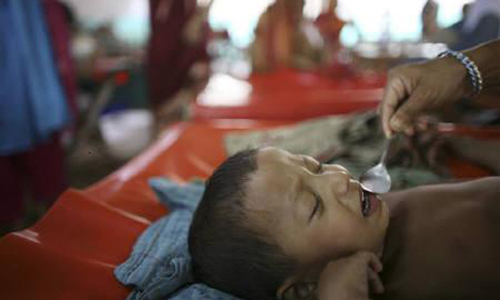ISLAMABAD: Micro-nutrient deficiencies are widespread in Pakistan and have profound effects on immunity, growth and mental development of children. Every year, more than 177,000 Pakistani children die before their fifth birthday due to malnutrition.
This was highlighted by Minister for National Food Security and Research Syed Fakhar Imam while addressing participants of a workshop titled ‘Addressing Zinc Deficiency through Biofortification of Zinc Wheat’ on Wednesday.
The workshop was jointly organised by HarvestPlus, Pakistan National Heart Association (Panah) and National Fortification Alliance at the Ministry of National Health Services. It was attended by representatives from various government departments, civil society organisations and UN agencies.
Says three biofortified wheat varieties that are high in zinc released for general cultivation
Mr Imam said more than 50 million people in Pakistan had inadequate zinc intake which was an important micronutrient for our health.
“In Pakistan, with the collaborative support of HarvestPlus, three biofortified wheat varieties which are high in zinc have been released for general cultivation in the country,” he said, adding that “with our joint efforts, biofortified zinc wheat varieties have been cultivated on 360,000 hectares this year”.
The minister said over 1.6 million metric tonnes of biofortified wheat grain production were expected with the current crop at the time of harvest.
“Biofortification is progressing well in Pakistan and has great potential to help reduce zinc deficiency and stunting in the children of our country,” he said.
Sanaullah Ghumman, general secretary of Panah, said malnutrition and dietary factors contribute towards increased morbidity and mortality.
Munawar Hussain, consultant/adviser at HarvestPlus, said the role of media was important in raising awareness among population about issues like zinc deficiency. He requested the media to play its due role towards raising awareness among farmers and other value chain actors about significance of biofortification of wheat.
Dr Imtiaz Hussain, director of Crop Science Institute, National Agricultural Research Centre, said wheat constituted 60pc of the diet of the common population and biofortification of wheat was the most suitable and sustainable strategy to address the zinc deficiency.
Dr Mohammad Imtiaz, wheat value chain specialist at HarvestPlus said a team under Commercialisation of Biofortified Crops (CBC) programme worked with a wide variety of stakeholders from the public and private sectors in Pakistan to popularise nutrient-rich biofortified zinc wheat varieties.
“We have created biofortified wheat production hubs in five districts including Faisalabad, Khanewal, Multan, Bahawalpur and Rahimyar Khan,” he said, adding that technological support will be provided through these hubs to selected farmers and also help in aggregation of biofortified grain after harvest.
Dr Khawaja Masood Ahmed, national coordinator (nutrition) at the health ministry said provincial governments may be encouraged to prioritise procurement of biofortified wheat.
Dr Shahzad Ali Khan said that zinc deficiency has a negative impact on the health of children and adults. Zinc deficiency is one of the causes of high rates of stunting in children, he said, adding inadequate intake of zinc causes growth retardation, loss of appetite and impaired immune functions.
Afshan Tehsin Bajwa said that good nutrition is the fundamental right of every Pakistani. She appreciated the progress made in development of biofortified wheat in Pakistan and hoped that more people will be able to receive wheat that has a higher amount of zinc.
Published in Dawn, December 16th, 2021
































